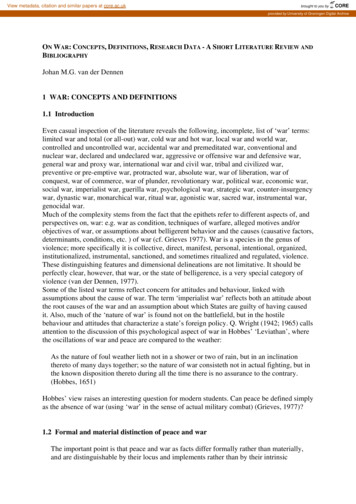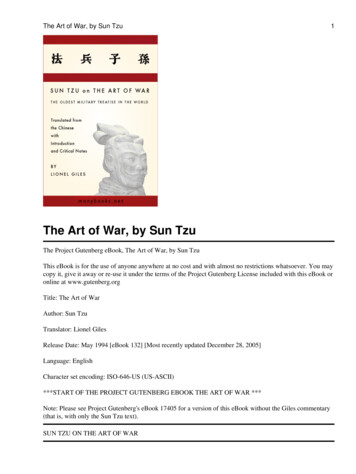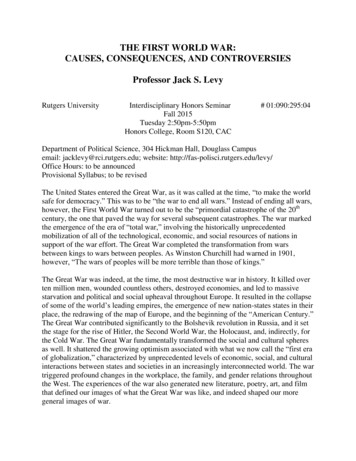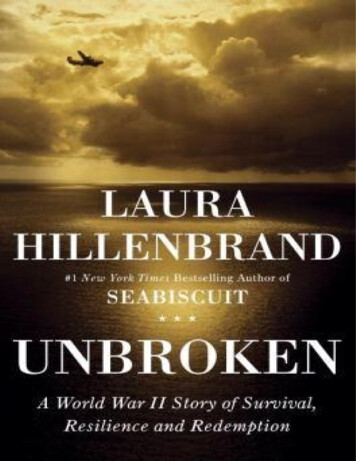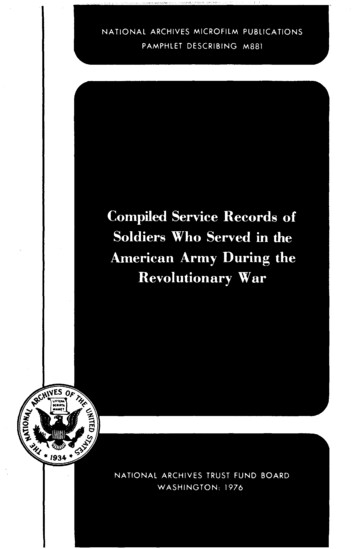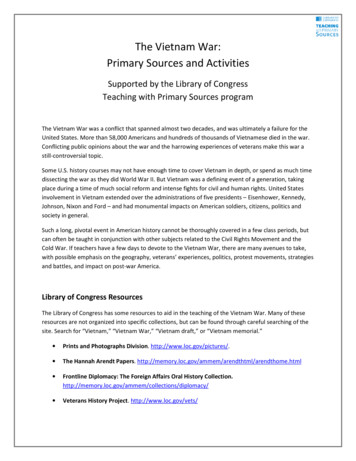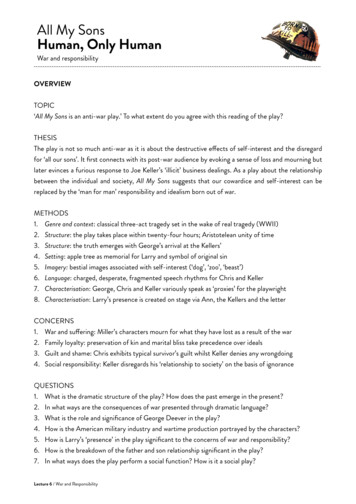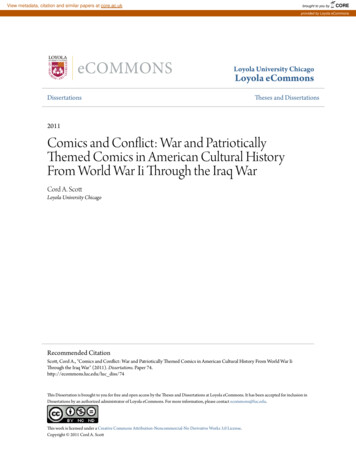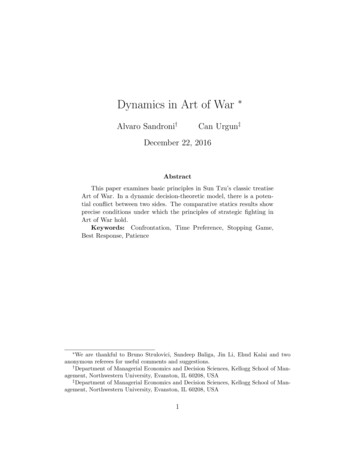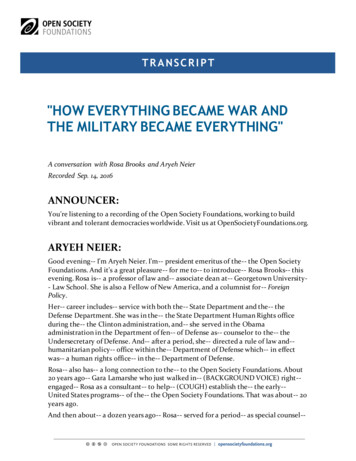
Transcription
TRANSCRIPT"HOW EVERYTHING BECAME WAR ANDTHE MILITARY BECAME EVERYTHING"A conversation with Rosa Brooks and Aryeh NeierRecorded Sep. 14, 2016ANNOUNCER:You're listening to a recording of the Open Society Foundations, working to buildvibrant and tolerant democracies worldwide. Visit us at OpenSocietyFoundations.org.ARYEH NEIER:Good evening-- I'm Aryeh Neier. I'm-- president emeritus of the-- the Open SocietyFoundations. And it's a great pleasure-- for me to-- to introduce-- Rosa Brooks-- thisevening. Rosa is-- a professor of law and-- associate dean at-- Georgetown University- Law School. She is also a Fellow of New America, and a columnist for-- ForeignPolicy.Her-- career includes-- service with both the-- State Department and the-- theDefense Department. She was in the-- the State Department Human Rights officeduring the-- the Clinton administration, and-- she served in the Obamaadministration in the Department of fen-- of Defense as-- counselor to the-- theUndersecretary of Defense. And-- after a period, she-- directed a rule of law and-humanitarian policy-- office within the-- Department of Defense which-- in effectwas-- a human rights office-- in the-- Department of Defense.Rosa-- also has-- a long connection to the-- to the Open Society Foundations. About20 years ago-- Gara Lamarshe who just walked in-- (BACKGROUND VOICE) right-engaged-- Rosa as a consultant-- to help-- (COUGH) establish the-- the early-United States programs-- of the-- the Open Society Foundations. That was about-- 20years ago.And then about-- a dozen years ago-- Rosa-- served for a period-- as special counsel--
TRA NSCR IPT: HOW EV ERY THING B ECAM E WAR AND TH E MILITA RY B ECAME EV ERY THINGin the office of the-- the president of the Open Society Institute, at the time that-that I was the-- the president of the Open Society Institute. And-- her connection tothe-- the Open Society Foundations-- also-- includes-- service today as-- a member ofthe-- the board of the-- the U.S. programs-- of the-- the Open Society Foundations.She has-- written-- an important book. Rosa has-- what I think of as an effervescent-writing style-- which makes it-- a pleasure to read-- even when she is dealing withthe-- the gravest-- issues. And so-- it's-- not only-- a book that is-- worth reading-but it is a book that is-- enjoyable to read. If you haven't-- obtained a copy-- there arecopies for sale-- outside. And I think Rosa can probably be inveigled into-- to signingbooks-- if you-- purchase a copy-- this evening. So Rosa-- why don't you say-something-- about the book, and then-- we'll open it up for-- questions anddiscussion?ROSA BROOKS:Thank you, Aryeh. I will go up here. (NOISE) Aryeh, thank you-- thank you so muchfor that kind introduction. And it, for me, it is fantastic to be here at the Open SocietyFoundation because what-- what Aryeh did not say-- is that this book would not evenexist had it not been for the Open Society Foundation and for Aryeh.When-- more than ten years ago, 12 years ago-- Aryeh asked me if I would be willingto write a short-- think piece. He wanted to put together, this is a couple years after-after the 9/11 attacks. This was before-- stories like the Abu Ghraib torture scandalhad broken. And-- and he asked me-- he wanted to put together-- a group of peopleto talk off the record about the question of whether international humanitarian lawwas adequate for the challenges posed by-- non-state terrorism.And he said, "Would you be willing to write a think piece just arguing no, and I'mgonna get somebody else to write a piece arguing yes, and I think that will help createan interesting discussion if we have, you know, two pieces that frame the issues invery different ways."And-- he even offered a little bit of money, and I thought, "Great, I'm-- I'm broke." Iwas a broke young law professor, junior facility member, and I was very happy toaccept that. And so I wrote a short paper which led to a very lively internaldiscussion-- which made me start thinking about these issues. And turned into a LawReview article which I guarantee absolutely no one is going to ever read, whicheventually led me to try to write this book in the hope that somebody other than-my student research assistant would read it. And it-- so if it hadn't been for that, thebook would not have been written. And the year I spent here as Aryeh's specialcounsel, which was a fancy way I was saying-- of saying that I was a Fellow-- sort ofhanging around doing my own work, and putting together some colloquy on civil military relations and other issues-- the book would never would have been written.So Aryeh, thank you so much-- for all of the work that you have done over the years,but also for playing such an important role, and enabling me to-- to write this book.2
TRA NSCR IPT: HOW EV ERY THING B ECAM E WAR AND TH E MILITA RY B ECAME EV ERY THINGIt was not completely a forgone conclusion that I would end up working at thePentagon. Some of my earliest memories are sitting on a picnic blanket, my-- atCentral Park celebrating the end of the Vietnam War. I don't remember much aboutit, except that someone gave me one of those little lollipops with crossed sticks,which I found extremely exotic. And this event has lived in my memory ever since.My-- my parents were very active in the anti-war movement. I certainly did not growup thinking-- I'm gonna go work at the Pentagon-- end up-- I ended up marrying anArmy officer. My mother took a while to adjust to that, although she eventually said,"I guess it's good to have an armed wing of the family." (LAUGHTER) My-- my fatheris sitting here now, and he's-- he's making facing. I always also try to bring my familywith me to these events, in case the audience isn't big enough, it's good to have yourfamily (LAUGHTER) fill it out.But I-- I'll tell another story about my mother, actually. When-- when I was(COUGH) at the Pentagon-- I had been working there for maybe six months or so.And-- I-- I asked my mother if she wanted to come and have lunch with me at thePentagon. And she sort of gave me a suspicious look, and-- and, you know, she hadlast present at that building trying to levitate it-- (LAUGHTER) and she said, "Okay."So-- so she-- so my mother comes to lunch at the Pentagon-- she comes through thevisitor entrance-- Aryeh in fact once had this experience. Aryeh also came to visit thePentagon with me at one point. But she comes through the visitor's entrance. Shegets through the multiple layers of security. We're walking through the corridors, andwe're walking past the food court, and we're walking past the florist shot, and we'rewalking past the candy shop, and we're walking past the CVS and the souvenir store,and the running shoes store. And suddenly she stops still, and she just-- (BANG) and- and I stop. I look at her, and, you know, "What's wrong?" And she says, "You'retelling me that the heart of American military power is a shopping mall?"(LAUGHTER) Yes, as a matter of fact-- yes. (LAUGH) She wasn't far wrong.You know, the Pentagon-- is the world's largest office building. It has 17.5 miles ofcorridors. It has more office space than the Empire State Building. It's just sort ofshort and squat rather than tall. There are 23,000 people who work in it. And over theyears-- the Pentagon itself has sprouted dozens of shops and restaurants to cater tothe 23,000 military and civilian employees who work there.And over time-- the U.S. military itself has come to offer a similar kind of one-stopshopping experience-- to the nation's top policy makers. So it's slightly surreal todayat the Pentagon. You can-- you can buy a pair of new running shoes-- or you canorder up a marine expeditionary unit to patrol in the Philippines. You can buy someTylenol at CVS if you have a headache, or you can order a team of Special Forcesmedics-- to go fight malaria in Chad.You can buy a new cell phone, or if you're sufficiently senior, you could task theNational Security Agency with monitoring the cell phone communications ofsuspected terrorists. You can buy a small chocolate sculpture of a fighter jet, yes youactually can-- (LAUGHTER) or you can order a drone strike in Yemen.3
TRA NSCR IPT: HOW EV ERY THING B ECAM E WAR AND TH E MILITA RY B ECAME EV ERY THINGYou name it, the Pentagon supplies it. My friend-- retired Lieutenant General DaveBarno once said to me, "I think the U.S. military in the Pentagon has become-- it'slike Super Walmart-- he said, with everything under one roof. And what we have seenin the last-- last-- two presidential administrations is two successive presidentialadministrations that have been extremely eager consumers-- of everything that thePentagon has to sell.Needless to say, the military's transformation into the world's largest one-stopshopping outfit-- is not necessarily a cause for celebration. But I think it's both theproduct and the driver, really seismic changes in how-- how we think about war withsome consequent challenges both to the law, the rule of law, and to the military itself.And in fact we've-- we've become trapped in something of a vicious circle. As theUnited States faces novel kinds of security threats coming from novel quartersranging from threats that come from non-state terror networks that cross borders, tothreats that come from cyberspace to threats that relate to the impact of poverty,repression, genocide, climate change, et cetera.What's happened is that we have gotten into the habit since 9/11 of viewing all ofthese new kinds of threats through the lens of war, and asking the military to take onan ever-expanding range of non-traditional tasks-- by viewing more and more threatsas war, what we also do is we bring more and more spheres of human activity into theambit of the law of war. With much-- with it's much greater tolerance for secrecy, forlethal force, for coercion, and with its reduced protections for human rights.Meanwhile, we ask the military to take on more and more non-traditional tasks. Thatmeans you have to find money for it to do that, which means you have to look forsavings elsewhere, which means that we end up cutting or freezing the budgets ofcivilian foreign affairs organizations, State Department, USAID. Budget cuts thencripple those agencies, which means that their capabilities dwindle, which meansthat we look to the military to pick up the slack even more-- and the-- the-- the cyclestarts to continue.It's the old adage-- you know, if you're tool's a hammer, everything looks like a nail. Ifyou're functioning government institution is the military, everything starts to looklike a war. And if everything looks like a war, then everything looks like a job for themilitary. And when everything looks like a war, then it looks like war rules, the legalframework for war applies to more and more things. And everything looks like amilitary mission displaces the civil institutions, and undermines their credibility evenwhile it overloads the military itself.Why does this matter? I-- you all know-- probably the famous lines fromShakespeare's Henry V-- "Here's what's at stake. When we decide whether to framesomething as war or not war-- in peace there's nothing so becomes a man as modeststillness and humility, but when the blast of war blows in our ears, then imitate theaction of the tiger, stiffen the sinews, summon up the blood disguised fair nature withheart-favored rage."Which is a much fancier than I would ever come up with of saying something that we4
TRA NSCR IPT: HOW EV ERY THING B ECAM E WAR AND TH E MILITA RY B ECAME EV ERY THINGall know, right, which is that we expect different things in war time, and fromwarriors than in peace time-- and from people who are not warriors, that-- we expectin war time, we expect warriors to act in ways that we would consider immoral andillegal in peace time.What happens when the boundaries around war begin to blur-- and when theboundaries around warriors begin to blur, is that we lose our ability to decide whichactions should be praised, and which should be condemned. Throughout humanhistory, human societies have tried to draw sharp lines between war and peace forprecisely this reason. You know, until less than a century ago, at least at the formallevel, most western societies insisted that war should be formally declared, take placeon clearly delineated battle fields between-- be fought by uniformed soldiers whooperated within specialized, elaborate, and hierarchical military organizations.In different societies and earlier times, humans have found other ways to mark theboundaries between war and not war, warriors and civilians. I'll give you just a coupleof examples. This is-- I'm a sort of anthropologist monkay (PH) so this for me was themost fun part of researching the book.The Navajo, and the American southwest-- literally Navajo warriors would speak adifferent dialect, with different vocabulary when they set out on raids. And thenwhen they came home from raids, the warriors would draw a line in the desert sand,they would turn around, face back their home territory, and face away from theenema-- enemy territory, step over the line, and resume the ordinary language.Among the Macao and Papua (COUGH) New Guinea-- warriors-- had to wearelaborate masks, and elaborate war paint and spend months-- engaging in variousrituals to-- to create war sorcery to enable them to become fearsome warriors whocould kill. During that period they had to abstain both from certain foods and drinks.They also had to abstain from sexual relations during that time period. And whenthey returned from war, they had to go through a similar period of abstinence,because if they didn't, if they had sexual relations with their spouses before the warsorcery had worn off-- if there were any cuts or holes in their bodies, that the ideawas the-- the-- the toxins of war would leach into their bodies, killing them both.That war was conceptualized as literally toxic to ordinary community life and humanrelationships.And there are lots and lots of other examples, I'm sure you can think of many of themor rituals that we use to distinguish between war and peace, between warriors andnon-warriors. We tend to think that we're different, that these are just things thatprimitive societies used to do. But of course we do exactly the same thing today.Think of the rituals that relate to basic training-- for Army or Marine Corps recruitsor cadets at our military academies. Where their hair is shorn, we strip them of theirordinary clothes, and we put them in uniforms with mystical-colored ribbons on theirchests that can't be decoded, except by insiders. They learn a new language, theymemorize (NOISE) arcane bits or lore-- and indeed we, much like-- many of ourforbearers and other societies, we too name our weapon systems and so on after5
TRA NSCR IPT: HOW EV ERY THING B ECAM E WAR AND TH E MILITA RY B ECAME EV ERY THINGtotem animals, and pre-- you know, the predator, the reaper, the hornet-- hopingthat we will take on the fearsome characteristics of these-- these beasts when we goto war.And despite the changes, and-- and, you know, the function of all these differentkinds of rituals is very much the same. The function is to say, we wanna have-- wewanna know the difference between war and not war, and warriors and civilians. Weneed to know the difference. And I'll talk a little bit more about what's at stake interms of law in a minute.But despite the changes that have been ushered in by 9/11, despite the increasingnumber of sort of inchoate threats, we-- we till-- we still tend to view war as a distinctand separate sphere of something that is totally unrelated to the ordinary world ofshopping malls, and soccer games, and office buildings. And we relegate war to themilitary, which is a distinct social institution that we simultaneously lionize, andignore.We like to think that war is an easily recognizable exception to the normal state ofaffairs. And we think of the military as an institution that we can easily, iftautologically define as the institution that engages in war, whatever that is. Troubleis in our modern world-- the post 9/11 universe-- war just isn't a distinct sphere to theextent that it ever was. It clearly isn't anymore.In a world of terror networks that cross borders of cyberthreats, disruptive non-stateactors-- our traditional categories of war, peace, warrior, civilian don't work veryeasily anymore. It's gotten harder and harder to figure out how to apply them in acoherent way. And I'll just-- a few examples.In a war on terrorism, or a cyber war-- we can't delineate any boundaries in time or inspace. It's not clear where the war is. You can't say, "Ah hah, the war is in France, butnot at Switzerland, 'cause it's neutral." You know, you can't say, "Here is where it is,and not here." You can't delineate boundaries in time. "Here's where the war began."It's hard to even imagine an ending when you're not dealing with organized stateactors, or even organized non-state actors.We aren't sure what counts as a weapon any more. A civilian-- hijacked civilian jetliner, a box cutter, the kind you can buy at CVS-- a line of malicious computer code.We can't even define the enemy. The United States has been dropping bombs onsomebody in Syria for a couple years now. But I think most Americans, and in myexperience unfortunately also most executive branch officials in the U.S. government,would be hard-pressed to articulate who it is that we're fighting against much of thetime.And we've also lost any coherent basis for distinguishing between combatants andcivilians when we're no longer talking about the uniformed, hierarchically-organizedmilitary of states, or even similarly organized insurgent groups, for instance. Wedon't know who counts-- who counts as a warrior, and who doesn't. Is a Chinesehacker who is part of hacking into U.S. government computers, is that person acombatant under certain circumstances?6
TRA NSCR IPT: HOW EV ERY THING B ECAM E WAR AND TH E MILITA RY B ECAME EV ERY THINGWhat about a financier for Somalia's Al-Shabaab? What about a Pakistani teenagerwho spreads extremist propaganda on Facebook, or a Russian engineer who's paid byISIS to maintain-- (COUGH) captured Syrian oil fields, are they combatants or arethey civilians? It's gotten pretty-- pretty slippery in the context of the-- the-- evermetastasizing war on terrorism.And all of this matters, right. And it matters-- for the very simple reason that wehave-- when there-- when there is a war, the law of war applies. And the law of wargives states and their agents enormous amount of latitude in using lethal for-- lethalforce and other forms of coercion. And this is the-- the fancy term lawyers use, here isthe lex specialis, the law of armed conflict is the lex specialis, it means special law.The rest of the law is the lex generalis, the general law. And the lex specialis, thespecial law, applies in these special circumstance of war. It doesn't apply the rest ofthe time.But that whole system of saying we have a law of war, it applies in these specialcircumstances is obviously premised on the idea that you can tell the difference. Thatit's-- and it's easy and straight forward to tell the difference. And we have thiselaborate set of rules that only apply during wars, and that's great, and-- and we cantolerate a certain amount of reduced rights protections, and reduce-- and greatertolerance for state secrecy for instance, when our framework is that war is the easilyrecognizable exception.But obviously when the boundaries around war get blurry, it gets harder and hard toknow when you apply that set of rules, and when you don't. In peacetime-- obviouslywe think that due process is really important. You don't just get to go around and killsomebody, or to put it totally bluntly, and to-- to caricature it a little bit, you know-if I walk outside, and I bash the nearest person over the head with my heavymicrophone here, you know, we-- we-- we hope that the police come along and arrestme, and I'm charged, and I'm tried, and I go off to jail for murder, or for attemptedmurder. But if I'm a combatant during war time, and I kill someone who is an enemycombatant-- I might even get a medal for it, you know.So the-- the rules are very different. They're profoundly different, the rules and termsnot only of who you can kill, but what circumstances the state can monitor yourcommunications, and detain you, and a whole range of other things, with whatdegree of due process, what degree of accountability, what degree of secrecy, areradically different.Trouble is, if we lose our ability to figure out what counts as a war, you know, if we'renot sure anymore when to apply this special set of rules, and when that special set ofrules don't apply clearly. You know, when-- when we're used to thinking of war as atemporary, an obvious state of exception, and we'll know it when we see it. We'llalways know what a war is, you can tell. When we lose that ability to distinguish in acoherent and principled way between what counts as war, and what doesn't count aswar, we-- also our ability to-- we lose any principle basis for making the mostimportant decisions a democracy can make. What matters, if any, should be beyondthe scope of judicial review? When can a government have secret laws, and engage in7
TRA NSCR IPT: HOW EV ERY THING B ECAM E WAR AND TH E MILITA RY B ECAME EV ERY THINGsecret activities, and when is it not allowed to do that?When can a state monitor the private communications, or censor the privatecommunications of citizens? Who can be imprisoned for how long, with what degreeof due process, and ultimately who lives and who dies? You know, when and underwhat circumstances-- can lethal force be used, and against whom?It matters a lot if we're at war. Take an issue like drone strikes that people spendmay-- more controversial than many of the things that I talk about in the book, andprobably more publicity. If we're in a war, legally speaking-- with al-Qaeda and itsassociated forces, and that war extends to wherever the associated forces are. Andthose associated forces don't have to be wearing a uniform, and don't have to becarrying anything that looks like a traditional weapon necessarily-- and don't have tobe engaged in what traditionally looks like an attack, or maybe thinking of somefuture-- (COUGH) something that we construe as an attack.Then U.S. drone strikes, or other forms of targeted killing are lawful wartimetargeting of any enemy combatants. And they're-- they're not morally or legally anydifferent than an American soldier on D-Day shooting at a German machine-gunnest, and killing a German soldier. There's nothing new here if it's a war.If it's not a war, they're just murders. If it's not a war, then the U.S. government ismurdering people overseas. So we really wanna know the difference, right. We reallywanna know the difference, because (LAUGH) we really wanna be on one side ofthat, not on the other side. So a lot-- it-- a lot is a stake.There are also institutional consequences of this for the military itself. Perhaps ofless-- less interest to this audience-- but I spent a lot of time talking to militarycommunities, and some of the issues that-- that trouble people in those communities.One of the things that happens when-- when we expand what we label war, youknow, when everything looks like war, then everything looks like a job for themilitary. And we-- so we also lose our ability to make kind of sound or coherentdecision about what tasks would we assign to the military, and what tasks should weleave to civilians?So right now we have American military personnel in literally almost every countryon earth, almost every country on earth. Not necessarily in large numbers, in manyplaces the numbers are quite small. But they are not only on almost-- in almost everycountry on earth, but they are undertaking virtually every task on earth. We havemilitary personnel who launch raids, and agricultural reform pro-- projects. Theyplan airstrikes, and small business development initiatives. They trainparliamentarians, and produce (NOISE) TV soap operas. They patrol for pirates. Theymonitor global e-mail communications. They design programs to prevent humantrafficking in the Pacific. And they vaccinate cows.You name it, somebody in the military's doing it. This was actually one of the kind ofthings that was both slightly terrifying and kind of awe-inspiring when I was at thePentagon to realize that (COUGH) pick a topic, pick anything, pick a problem in theworld, and someone in that building was working on it. Which was kind of amazing,8
TRA NSCR IPT: HOW EV ERY THING B ECAM E WAR AND TH E MILITA RY B ECAME EV ERY THINGbut also (LAUGH) kind of alarming when you-- depending on your perspective.And I-- many years ago when I was-- when I was in law school, right around the timethat I started doing some consulting work for Gara and Aryeh-- I was also-- so unsureof what I wanted to do, I interviewed for a job with McKinsey and Company, themanagement consulting company. And they have this interview process where you-you're-- you-- you're given these elaborate hypotheticals, and you have to come upwith, I assume what the right management consultant kind of thinking is todemonstrate your suitability to be a strategy consultant.And one of the questions that I got-- was, "Well, imagine that you run a small momand-pop grocery store. And everything is going great. And then one day, Walmartannounces that they're moving in down the block. You know, what do you do?" And Isaid-- I said something, like, "Ho, ho, well, roll over and die. It's all over."(LAUGHTER) And that-- was apparently was the wrong answer. (LAUGHTER) Youknow, I was supposed to say something, like, you know, "Oh, I would not go downwithout a fight, I would find a niche, I would make artisanal Aztec chocolate coffeewith soy woodchips from, you know, a collective in Nigeria. And then everybodywould come, because I would have this special niche that Walmart could not hope toreplicate, I would be so interesting and original and--"But we all know that in fact the odds would be on the mall. The-- the-- the writing'son the wall. The odds would be-- vo-- odds would be against me, you know. WhenWalmart moves down the block-- you're in trouble if you're the little mom-and-popshop. And like Walmart, today's military can marshal vast resources, and exploiteconomies of scale in a way that the little mom-and-pop shops cannot hope toreplicate. And like Walmart, the tempting one-stop shopping convenience that isoffered-- has had a devastating effect on smaller, more traditional enterprises, whichin this case would be enterprises such as the U.S. Department of State, the-- U.S.Agency for International Development, and-- and so on and so forth.We've seen the State Department, other U.S. civilian foreign-- foreign p-- policy andforeign assistance agencies shrinking in-- into greater and greater irrelevance-- whenit comes to the foreign affairs of the United States. The Pentagon is not better atpromoting agricultural or economic reform than the State Department or USAID is.Most of the time the Pentagon is somewhat worse at it. Not always, since state'srecord, and AID's record's not so great either, but most of the time, however, themilitary is not as good at it.But unlike USAID and the State Department, what the Pentagon does have at itsdisposal is millions of employees who are willing to work long hours in horrendousand dangerous conditions, and it's open 24/7. You know, it's-- it's fashionable to hateWalmart-- I'm sure most of you would not admit to going to Walmart. You know,argh, argh, yuck, we don't go to Walmart. We don't like it because we think the goodsit produces are cheap, and tacky, and-- we don't like it because of it's-- it's sheervastness, and it's sort of mindless ubiquity, and the-- the sense we all have I think ofthe human pain that's at the heart of the enterprise.9
TRA NSCR IPT: HOW EV ERY THING B ECAM E WAR AND TH E MILITA RY B ECAME EV ERY THINGAnd most of the time we don't wanna see Walmart-- either. We-- we use our zoninglaws to exile it, and the other big-box stores to the commercial hinterlands outside oftown, so we don't actually have to look at it. But much as we resent it-- many of uswould be very hard pressed to live without it. You know, sooner or later we all findourselves going in because it's just so darn convenient. It's cheap. It's got everything,we don't have to go to 18 little places. And as the U.S. military struggles to define itsrole and mission, it's evoking, I think, some similarly contradictory attitudes from thecivilian population.Civilian government officials want a military that costs less, but can provide more, amilitary that will stay deferentially out of strategy discussion, but will be eternallyavailable to ride to the rescue-- a military that will prosecute our perpetuallyexpanding wars, but will not ask us to confront any of the different moral or legalquestions that are created by the blurring boundaries between war and not war.And we want a military that will solve every global problem, but will be content tostay safely quarantined on isolated bases, separated from the rest of us by barbedwire fences, and anachronistic rituals, and often acres of cultural misunderstanding.And indeed-- as a footnote, you know, even as the boundaries around war haveblurred, and as the military's activities have expanded dramatically, the military itselfhas a human institution, has grown if anything more and more sharply delineatedfrom the broader society it's charged with protecting, leaving fewer and fewercivilians with the knowledge or the confidence to raise questions about how wedefine war, or how the military operates.It's not actually too late to change any of this. No divine power said, there are thesecategories called war and not war, and here's what you have to put in th
Sep 14, 2016 · It's the old adage-- you know, if you're tool's a hammer, everything looks like a nail. If you're functioning government institution is the military, everything starts to look like a war. And if everything looks like a war, then everything looks like a job for the military. And when everything
